Across party lines in the United States and especially in the international sector, the move toward renewable energy is becoming more mainstream. But are these solar stocks enough to power your portfolio? Read our list of the best solar stocks that could benefit from this push.
Best Solar Power Stocks
SunPower Corp. (NASDAQ: SPWR)
SunPower Corporation (NASDAQ: SPWR) is a leading residential solar and energy services provider based in California. The company offers integrated solar and storage solutions, including Tesla Powerwall 3, to help homeowners manage electricity costs and enhance energy resilience. In 2023, SunPower added 75,900 new customers, though this was a decline from the 111,600 added in 2022.
In August 2024, SunPower filed for Chapter 11 bankruptcy protection. The company entered into an asset purchase agreement with Complete Solaria, Inc. for $45 million, which included SunPower’s Blue Raven Solar business, New Homes division, and non-installing dealer network .
Following this, Complete Solaria rebranded itself as SunPower in April 2025 and reported its first profitable quarter in three years .

However, the bankruptcy and subsequent restructuring have led to challenges for some customers, particularly those with leased systems. Reports indicate that customers have experienced difficulties in obtaining repairs and support, with some systems remaining non-functional for extended periods.
As of May 2025, SunPower’s stock is trading at $1.26, reflecting a decline from its previous close. Investors should be cautious and consider the company’s financial stability and customer service issues before making investment decisions.
First Solar, Inc. (NASDAQ: FSLR)
First Solar is one of the most prominent solar companies on the market right now. It manufactures solar panels and offers support and maintenance for solar power operations.
The company was founded in 1990 and has built a very stable client base during its 30+ years in the business. Its business spans the globe, providing solutions on every continent except Antarctica.
First Solar recently scored a major, multi-year deal with BP’s solar subsidiary Lightsource BP for up to 5.4 Gigawatts of solar modules. During the 2020 pandemic, First Solar took steps to streamline its operations, resulting in a huge cash balance and the potential for expansion.
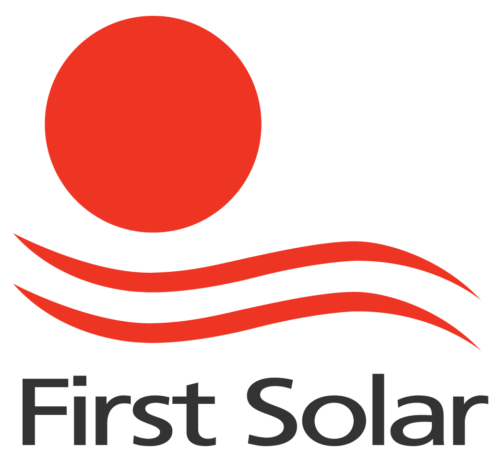
While it does not currently pay a dividend, its excess cash reserves mean that First Solar could easily offer one in the future. A downturn in November affecting much of the solar industry brought share prices down, and First Solar is working hard to recover.
In fact, the company is now in a situation where it is once again profitable, has strong margins, and is growing its capacity.
It may be able to increase its capacity in the US over the next two years and strengthen its position as the largest solar manufacturer in the nation.
Deeper connections with large utility-scale developers, purchasers, and consumers help ensure that its product is the best and most reliable in the contexts where it chooses to grow.
Investors in stocks are therefore ready to pay a little bit more since they know what they are purchasing. With new business on the horizon and financial stability, First Solar is a very attractive pick.
Sunnova Energy International Inc. (NYSE: NOVA)
Sunnova Energy looks to lead the charge in bringing solar power to residential spaces. The company provides homes with solar panels and battery storage so energy can be used as needed. Its products are already being used in 37 states from coast to coast.
A partnership with electric vehicle charging equipment company ChargePoint allows Sunnova to bring solar energy to charging stations. Setting the standard in customer service, Sunnova doesn’t shy away from repairs or replacements to keep its customer base happy.
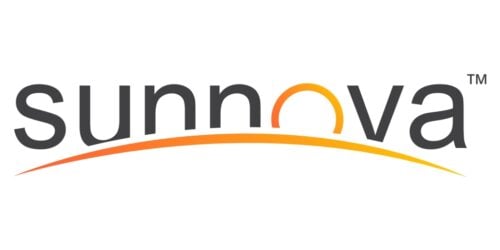
Like most solar stocks, share prices have been trending downward of late, even though shares are 50% higher than last year. Sunnova showed positive revenue numbers from last quarter as well.
The company’s market share for residential rooftop solar in the US is now between 4 and 5%, although it has been steadily increasing recently after an unfortunate downturn this year.
Only approximately 3% of the 84 million households in the United States have rooftop solar power, even though solar panels are an excellent energy source for single-family houses. Sunnova can consequently tap into a sizable total addressable value.
New incentives and increased electricity prices may be the catalysts to push many customers to solar in the future.
Brookfield Renewable Partners (NYSE: BEP)
Brookfield Renewable is another significant player in the renewable energy space. The company is a global leader in hydroelectric plants and works with solar, wind, and energy storage platforms.
As it looks to the future, Brookfield recognizes the potential for solar power and expects this form of energy to make up the majority of its production soon. Decreasing solar costs are helping to play heavily into this expectation.
Either way, Brookfield has some diversity by being involved with water and wind power generation. A new partnership with SSE Renewables allows Brookfield to expand further into the wind industry with tenders off the Dutch coast.
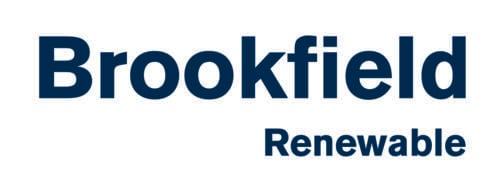
The use of renewable energy should indeed be expanded to reduce carbon emissions. It is economical to switch to solar and wind energy.
The production of energy using coal or gas is currently more expensive than that utilizing these two clean energy sources. In the future, their value arguments will be even more compelling.
These favorable breezes will help Brookfield Renewable. The business now has a development pipeline with a capacity of close to 69 gigawatts. Another 21 gigawatts are anticipated to be operational by 2030.
For this irrepressible stock, average yearly total returns in the neighborhood of 15% should be simple to achieve.
JinkoSolar Holding Co (NYSE: JKS)
JinkoSolar, headquartered in Shanghai, China, stands as one of the world’s largest solar module manufacturers, with a robust global presence spanning six production facilities. The company is renowned for its significant investments in research and development, boasting one of the industry’s largest solar R&D facilities.
This commitment to innovation has led to the development of high-efficiency solar panels, including the record-setting N-type TOPCon-based perovskite tandem solar cell, which achieved a conversion efficiency of 34.22% in early 2025.
In the first quarter of 2025, JinkoSolar reported module shipments of 17.5 GW, maintaining its position as the industry’s top supplier. However, the company faced financial challenges, posting a net loss of approximately $181.7 million, a significant decline from the net income of $609.4 million reported in Q1 2024.
Revenue for the quarter was $1.91 billion, marking a 33% decrease from the previous quarter and a 40% year-over-year decline. The downturn was attributed to low prices across the solar value chain and demand disruptions stemming from shifts in international trade policies.
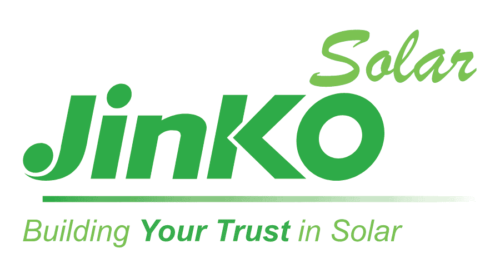
Despite these challenges, JinkoSolar’s order book visibility for 2025 remains strong, with projections indicating module shipments between 85–100 GW for the year.
The company is also expanding its energy storage system (ESS) business, with Q1 2025 shipments exceeding 300 MWh and a full-year target of 6 GWh, focusing on overseas markets.
JinkoSolar’s subsidiary, Jinko Solar Co., Ltd. (Jiangxi Jinko), completed its initial public offering on the Shanghai Stock Exchange’s Sci-Tech Innovation Board in January 2022, raising approximately $1.57 billion. Following the IPO, JinkoSolar retained a 58.62% stake in Jiangxi Jinko.
As of May 2025, JinkoSolar’s stock is trading at $18.35, reflecting a modest increase from the previous close.
Best Solar Stocks To Buy
Maxeon Solar Technologies, Ltd. (NASDAQ: MAXN)
Maxeon Solar Technologies, headquartered in Singapore, is a leading provider of high-efficiency solar panels. The company, a spin-off from SunPower in 2020, continues to operate under the SunPower brand outside the U.S. and Canada.
Maxeon boasts an extensive patent portfolio, with over 1,600 granted patents, underscoring its commitment to innovation in the solar industry.
In late 2024, Maxeon announced a strategic pivot to concentrate exclusively on the U.S. market. This decision involves transferring its global operations to TCL Group, its majority shareholder, and establishing a 2 GW solar panel manufacturing facility in Albuquerque, New Mexico, slated for completion by early 2026.
The move aims to leverage U.S. market incentives and strengthen its domestic supply chain. Additionally, Maxeon is actively defending its intellectual property and exploring licensing opportunities for its TOPCon technology.
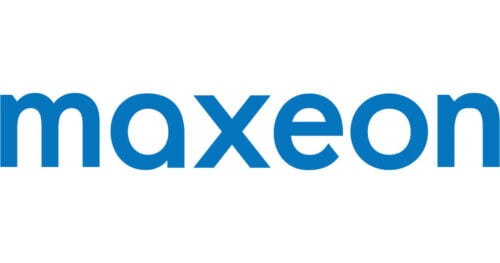
In the third quarter of 2024, Maxeon reported a significant decline in financial performance, with revenue dropping to $88.6 million from $227.6 million in the same period the previous year.
The company posted a net loss attributable to stockholders of $393.9 million, reflecting challenges such as U.S. Customs and Border Protection detentions and restructuring costs .
Despite these setbacks, Maxeon anticipates a return to positive EBITDA in early 2025, driven by new technologies and higher-priced utility-scale contracts .
Maxeon’s strategic focus on the U.S. market, coupled with its robust patent portfolio and plans for domestic manufacturing, positions the company for potential growth in the renewable energy sector.
However, investors should consider the company’s recent financial challenges and the uncertainties surrounding its restructuring efforts.
As of May 30, 2025, Maxeon’s stock is trading at $2.96, reflecting a modest increase from previous lows .
Enphase Energy, Inc. (NASDAQ: ENPH)
Enphase Energy specializes in home energy solutions, notably its semiconductor-based microinverters that convert solar power from direct current (DC) to alternating current (AC), enabling solar energy use in homes and businesses.
The company has expanded its offerings to include complete solar systems, energy storage solutions, and electric vehicle (EV) chargers, establishing a strong presence in North America and extending its reach into Europe and Australia.
In the first quarter of 2025, Enphase reported revenue of $356.1 million, a 35% increase compared to the same period in the previous year. The company achieved a GAAP net income of $29.7 million, or $0.22 per diluted share, marking a significant turnaround from a net loss of $16.1 million in Q1 2024.
Non-GAAP gross margin stood at 48.9%, though it declined from 53.2% in the prior quarter, primarily due to lower bookings of 45X production tax credits and product mix.

Despite the positive financial results, Enphase’s stock experienced volatility following the earnings report. The company’s Q1 revenue slightly missed analyst expectations, and its second-quarter guidance projected revenue between $340 million and $380 million, which was below some forecasts.
Additionally, the U.S. solar market faces challenges such as high interest rates and increased competition from third-party ownership (TPO) solar systems, which may impact Enphase’s growth prospects.
Enphase continues to innovate with new product launches, including the fourth-generation IQ Battery 10C and the IQ9 microinverter, designed for small commercial systems.
The company is also expanding its product portfolio to include the IQ EV Charger 2, now active in 14 European countries, and the IQ PowerPack 1500, a portable energy solution for various uses. These initiatives aim to diversify Enphase’s offerings and strengthen its position in the global energy market.
Sunrun Inc. (NASDAQ: RUN)
Sunrun manufactures, installs, and sells solar energy systems to residential solar energy customers. Equipment can be leased every month or can be purchased outright.
In the summer of 2020, Sunrun purchased Vivint Solar with an all-stock transaction, creating the largest consumer-facing solar company in the U.S. The company currently focuses all its attention on the U.S. market but hopes to expand outward in the future.

Sunrun added 30,700 customers this quarter alone, increasing its total number to over 600,000 users. The latest financial report shows that Sunrun exceeded its revenue and earnings per share goals.
Despite customer and revenue growth, shares have been trading in a downward direction so far this year, along with many other solar stocks. This drop could be a chance for investors to buy the dip, making Sunrun a stock to keep your eye on if you’re interested in consumer solar.
Should I Buy Solar Stocks?
Solar represents a small portion of the energy consumed in the United States each year, but that number is rapidly growing. A few years ago, solar power was only really available in sunny states like California and Florida. Today, solar power is available in most U.S. cities and states.
While solar energy is starting to impact residential growth significantly, it has also helped Fortune 500 companies save money. Apple, Amazon, Target, and Walmart have all invested heavily in solar facilities at various locations across the country.
In recent years, the public has grown to realize the importance of investing in clean energy sources and protecting our planet. This market is just now being primed for explosive growth, and you will not want to miss it.
That said, there are a few ground rules to consider about the industry. First, not every solar company is built to make money for shareholders.
Some of these companies are staying afloat on subsidies or money from venture capitalist dollars, which is why it’s so important to do a thorough analysis before jumping in.
While some companies dabble in solar energy or own subsidiaries in the solar power industry, we primarily focus on pure solar stock plays.
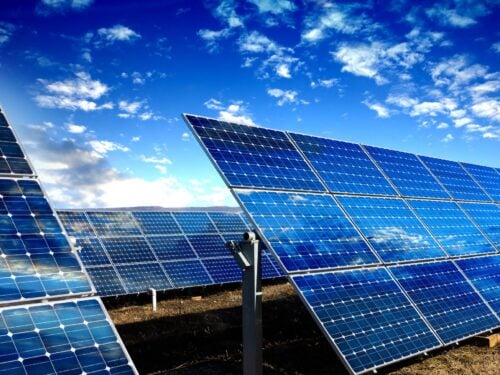
Where to Buy Solar Stocks
Now that you’ve decided to go solar, you’ll need to invest in a few stocks. Solar companies are well-grounded and spend their time on major exchanges like NASDAQ and NYSE. Your best bet for perusing these markets is through Robinhood or Webull.
Webull offers a plethora of complex tools that experienced investors can sink their teeth into. These tools are perfect for deep dives to locate those hard-to-find tickers. Robinhood is a breath of fresh air for traders drowning in difficult-to-use platforms.
Its simple user interface will have even beginner investors trading in no time.
Best Solar Stocks: Conclusion
These are some of the best solar stocks on Wall Street right now. There is plenty of upside in the sector and plenty of room for growth. Overall, solar energy only accounts for around 2% of the total grid usage right now.
That number is primed to go up in the near future. The current political climate in the U.S. also bodes very well for solar companies, as democrats desire to position the U.S. as a leader in green energy solutions.
We can expect to see solar stocks go up in price even more over the next few years as more residential and commercial properties switch to solar power.
Solar Stocks FAQ
Look no further for answers to some of the top questions on solar stocks.
What Is the Top Solar Company?
This article has touched on the solar companies with some of the best business models, customer bases, and output.
Stocks like SunPower, JinkoSolar, and First Solar are often highlighted for their successes in the field. Enphase Energy has also been quite successful and is worth watching.
Is There A Solar ETF?
Several ETFs contain slices of the major solar companies today. ETFs do not provide much exposure yet because the solar energy sector is too small and thinly traded. As soon as one of these appears to be a viable stock pick for gains, you’ll see it on this list.
What Solar Company Does Tesla Own?
Tesla runs the solar company SolarCity. The company was founded in 2006 and was acquired by Tesla in 2016 for $2.6 billion. Since SolarCity is a full-fledged subsidiary of Tesla, it does not have a stock ticker of its own.
What is the Best Energy Stock to Buy?
As the world moves toward sustainability, clean energy is the way to go. In our 6 Best Clean Energy Stocks Under 10 Dollars article, we outline some of our favorite picks. VivoPower International and Energy Fuels Inc. both look to be strong picks at present.
What is the Biggest Solar Company in the U.S.?
First Solar sits at the top of this list with the largest annual sales and number of employees. The company has some competition at the top but looks to be a strong contender to hold the position for the foreseeable future.


 Tags:
Tags:









